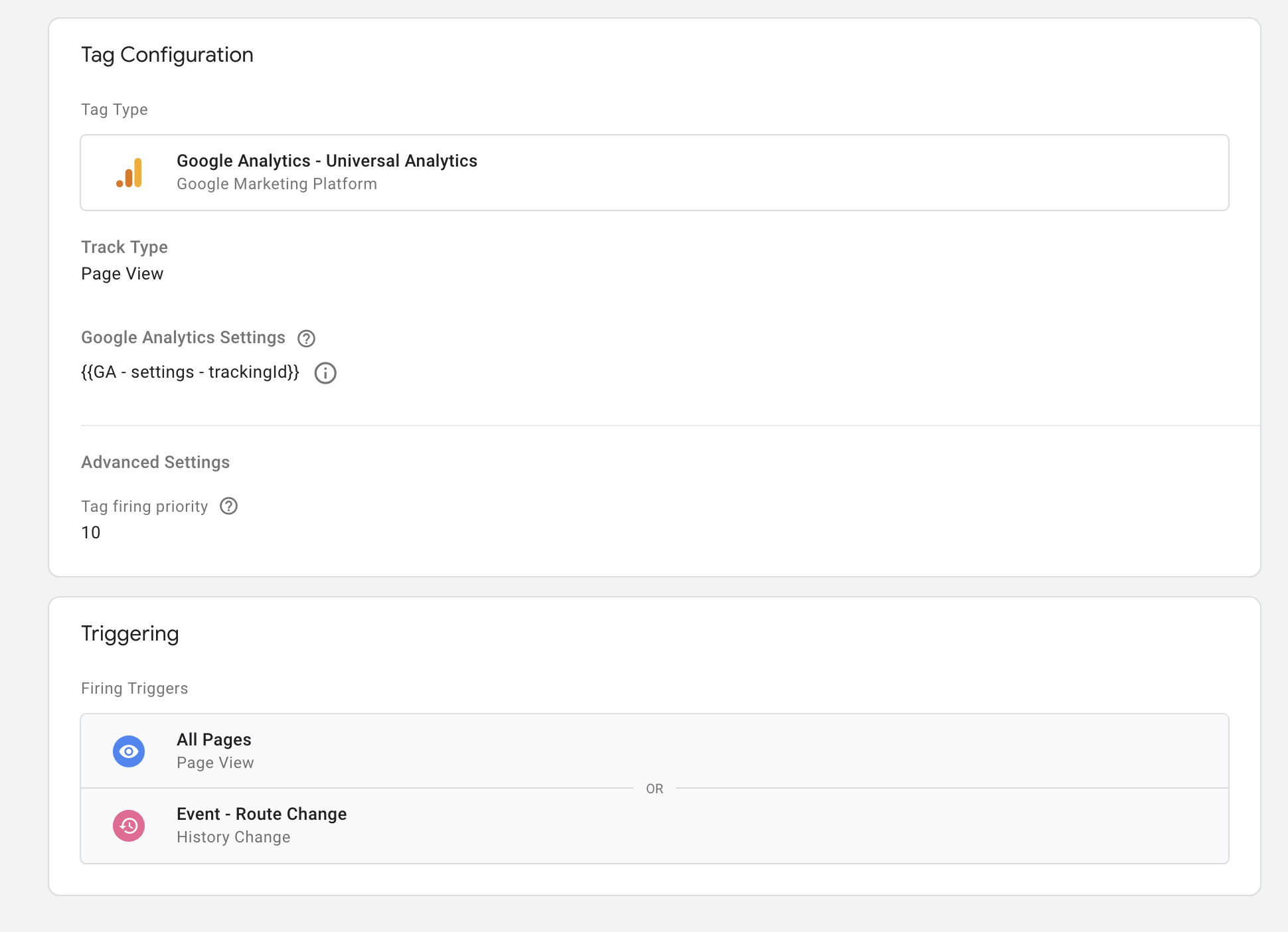
Security News
vlt Launches "reproduce": A New Tool Challenging the Limits of Package Provenance
vlt's new "reproduce" tool verifies npm packages against their source code, outperforming traditional provenance adoption in the JavaScript ecosystem.
@analytics/google-tag-manager
Advanced tools
Integration with google tag manager for analytics
This analytics plugin will load google tag manager into your application.
For more information see the docs.
Install analytics and @analytics/google-tag-manager packages
npm install analytics
npm install @analytics/google-tag-manager
The @analytics/google-tag-manager package works in the browser. To use, install the package, include in your project and initialize the plugin with analytics.
Below is an example of how to use the browser plugin.
import Analytics from 'analytics'
import googleTagManager from '@analytics/google-tag-manager'
const analytics = Analytics({
app: 'awesome-app',
plugins: [
googleTagManager({
containerId: 'GTM-123xyz'
})
]
})
/* Track a page view */
analytics.page()
/* Track a custom event */
analytics.track('cartCheckout', {
item: 'pink socks',
price: 20
})
After initializing analytics with the googleTagManager plugin, data will be sent into Google Tag Manager whenever analytics.page, or analytics.track are called.
See additional implementation examples for more details on using in your project.
The Google Tag Manager client side browser plugin works with these analytic api methods:
const analytics = Analytics({
app: 'awesome-app',
plugins: [
googleTagManager({
containerId: 'GTM-123xyz'
})
]
})
Initialization arguments
object Plugin settingsstring The Container ID uniquely identifies the GTM Container.The @analytics/google-tag-manager package works in the browser
Below are additional implementation examples.
Below is an example of importing via the unpkg CDN. Please note this will pull in the latest version of the package.
<!DOCTYPE html>
<html>
<head>
<title>Using @analytics/google-tag-manager in HTML</title>
<script src="https://unpkg.com/analytics/dist/analytics.min.js"></script>
<script src="https://unpkg.com/@analytics/google-tag-manager/dist/@analytics/google-tag-manager.min.js"></script>
<script type="text/javascript">
/* Initialize analytics */
var Analytics = _analytics.init({
app: 'my-app-name',
plugins: [
analyticsGtagManager({
containerId: 'GTM-123xyz'
})
]
})
/* Track a page view */
analytics.page()
/* Track a custom event */
analytics.track('cartCheckout', {
item: 'pink socks',
price: 20
})
</script>
</head>
<body>
....
</body>
</html>
Using @analytics/google-tag-manager in ESM modules.
<!DOCTYPE html>
<html>
<head>
<title>Using @analytics/google-tag-manager in HTML via ESModules</title>
<script>
// Polyfill process.
// **Note**: Because `import`s are hoisted, we need a separate, prior <script> block.
window.process = window.process || { env: { NODE_ENV: 'production' } }
</script>
<script type="module">
import analytics from 'https://unpkg.com/analytics/lib/analytics.browser.es.js?module'
import analyticsGtagManager from 'https://unpkg.com/@analytics/google-tag-manager/lib/analytics-plugin-google-tag-manager.browser.es.js?module'
/* Initialize analytics */
const Analytics = analytics({
app: 'analytics-html-demo',
debug: true,
plugins: [
analyticsGtagManager({
containerId: 'GTM-123xyz'
})
// ... add any other third party analytics plugins
]
})
/* Track a page view */
analytics.page()
/* Track a custom event */
analytics.track('cartCheckout', {
item: 'pink socks',
price: 20
})
</script>
</head>
<body>
....
</body>
</html>
Make sure you have your google tags manager setup to fire on Page views.
If you are using a SPA you want to listen to history changes as well.

See the full list of analytics provider plugins in the main repo.
FAQs
Google tag manager plugin for 'analytics' module
The npm package @analytics/google-tag-manager receives a total of 23,453 weekly downloads. As such, @analytics/google-tag-manager popularity was classified as popular.
We found that @analytics/google-tag-manager demonstrated a healthy version release cadence and project activity because the last version was released less than a year ago. It has 1 open source maintainer collaborating on the project.
Did you know?

Socket for GitHub automatically highlights issues in each pull request and monitors the health of all your open source dependencies. Discover the contents of your packages and block harmful activity before you install or update your dependencies.

Security News
vlt's new "reproduce" tool verifies npm packages against their source code, outperforming traditional provenance adoption in the JavaScript ecosystem.

Research
Security News
Socket researchers uncovered a malicious PyPI package exploiting Deezer’s API to enable coordinated music piracy through API abuse and C2 server control.

Research
The Socket Research Team discovered a malicious npm package, '@ton-wallet/create', stealing cryptocurrency wallet keys from developers and users in the TON ecosystem.